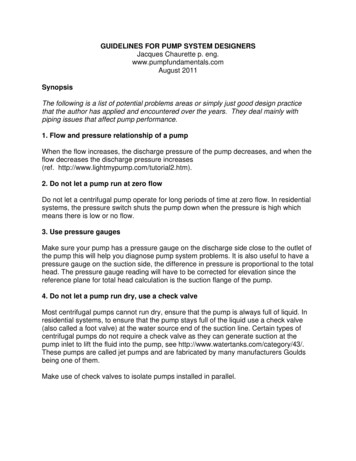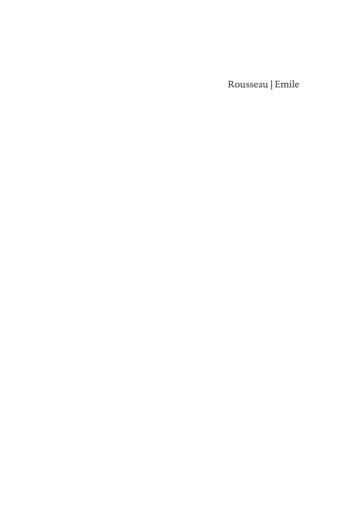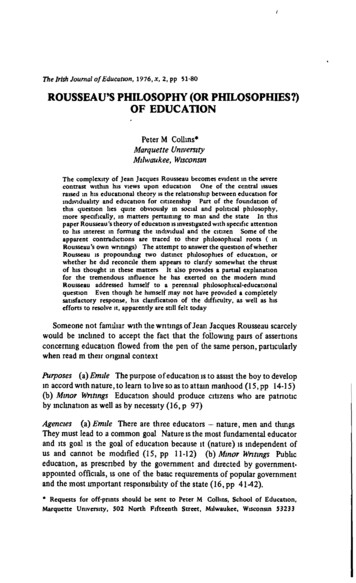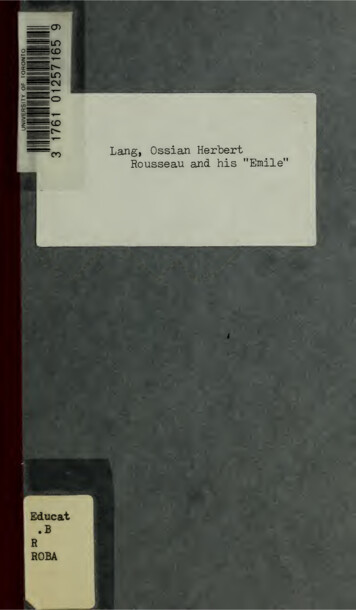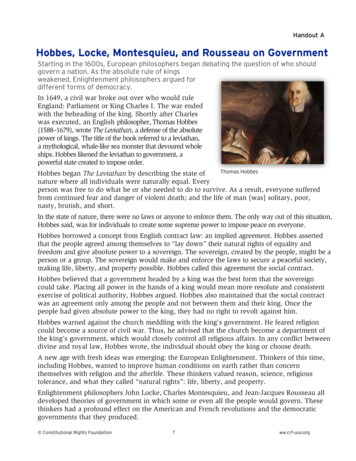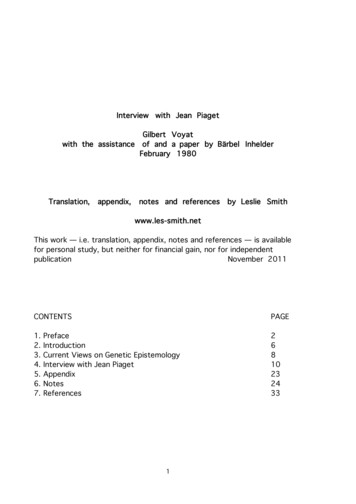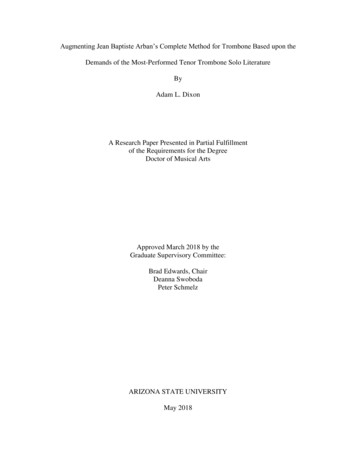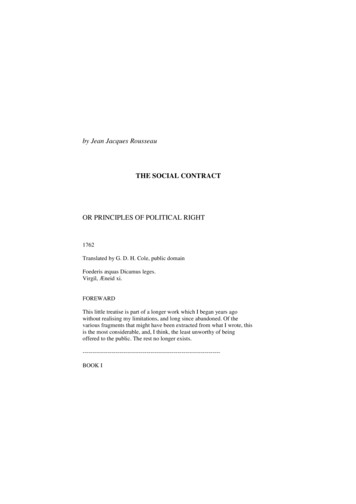
Transcription
by Jean Jacques RousseauTHE SOCIAL CONTRACTOR PRINCIPLES OF POLITICAL RIGHT1762Translated by G. D. H. Cole, public domainFoederis æquas Dicamus leges.Virgil, Æneid xi.FOREWARDThis little treatise is part of a longer work which I began years agowithout realising my limitations, and long since abandoned. Of thevarious fragments that might have been extracted from what I wrote, thisis the most considerable, and, I think, the least unworthy of beingoffered to the public. The rest no longer ---------------------------BOOK I
I MEAN to inquire if, in the civil order, there can be any sure andlegitimate rule of administration, men being taken as they are and lawsas they might be. In this inquiry I shall endeavour always to unite whatright sanctions with what is prescribed by interest, in order thatjustice and utility may in no case be divided.I enter upon my task without proving the importance of the subject. Ishall be asked if I am a prince or a legislator, to write on politics. Ianswer that I am neither, and that is why I do so. If I were a prince ora legislator, I should not waste time in saying what wants doing; Ishould do it, or hold my peace.As I was born a citizen of a free State, and a member of the Sovereign,I feel that, however feeble the influence my voice can have on publicaffairs, the right of voting on them makes it my duty to study them: andI am happy, when I reflect upon governments, to find my inquiries alwaysfurnish me with new reasons for loving that of my own country.1. SUBJECT OF THE FIRST BOOKMAN is born free; and everywhere he is in chains. One thinks himself themaster of others, and still remains a greater slave than they. How didthis change come about? I do not know. What can make it legitimate? Thatquestion I think I can answer.If I took into account only force, and the effects derived from it, Ishould say: "As long as a people is compelled to obey, and obeys, itdoes well; as soon as it can shake off the yoke, and shakes it off, itdoes still better; for, regaining its liberty by the same right as tookit away, either it is justified in resuming it, or there was nojustification for those who took it away." But the social order is asacred right which is the basis of all other rights. Nevertheless, thisright does not come from nature, and must therefore be founded onconventions. Before coming to that, I have to prove what I have justasserted.2. THE FIRST SOCIETIES2
THE most ancient of all societies, and the only one that is natural, isthe family: and even so the children remain attached to the father onlyso long as they need him for their preservation. As soon as this needceases, the natural bond is dissolved. The children, released from theobedience they owed to the father, and the father, released from thecare he owed his children, return equally to independence. If theyremain united, they continue so no longer naturally, but voluntarily;and the family itself is then maintained only by convention.This common liberty results from the nature of man. His first law is toprovide for his own preservation, his first cares are those which heowes to himself; and, as soon as he reaches years of discretion, he isthe sole judge of the proper means of preserving himself, andconsequently becomes his own master.The family then may be called the first model of political societies:the ruler corresponds to the father, and the people to the children; andall, being born free and equal, alienate their liberty only for theirown advantage. The whole difference is that, in the family, the love ofthe father for his children repays him for the care he takes of them,while, in the State, the pleasure of commanding takes the place of thelove which the chief cannot have for the peoples under him.Grotius denies that all human power is established in favour of thegoverned, and quotes slavery as an example. His usual method ofreasoning is constantly to establish right by fact.[1] It would bepossible to employ a more logical method, but none could be morefavourable to tyrants.It is then, according to Grotius, doubtful whether the human racebelongs to a hundred men, or that hundred men to the human race: and,throughout his book, he seems to incline to the former alternative,which is also the view of Hobbes. On this showing, the human species isdivided into so many herds of cattle, each with its ruler, who keepsguard over them for the purpose of devouring them.3
As a shepherd is of a nature superior to that of his flock, theshepherds of men, i.e., their rulers, are of a nature superior to thatof the peoples under them. Thus, Philo tells us, the Emperor Caligulareasoned, concluding equally well either that kings were gods, or thatmen were beasts.The reasoning of Caligula agrees with that of Hobbes and Grotius.Aristotle, before any of them, had said that men are by no means equalnaturally, but that some are born for slavery, and others for dominion.Aristotle was right; but he took the effect for the cause. Nothing canbe more certain than that every man born in slavery is born for slavery.Slaves lose everything in their chains, even the desire of escaping fromthem: they love their servitude, as the comrades of Ulysses loved theirbrutish condition.[2] If then there are slaves by nature, it is becausethere have been slaves against nature. Force made the first slaves, andtheir cowardice perpetuated the condition.I have said nothing of King Adam, or Emperor Noah, father of the threegreat monarchs who shared out the universe, like the children of Saturn,whom some scholars have recognised in them. I trust to getting duethanks for my moderation; for, being a direct descendant of one of theseprinces, perhaps of the eldest branch, how do I know that a verificationof titles might not leave me the legitimate king of the human race? Inany case, there can be no doubt that Adam was sovereign of the world, asRobinson Crusoe was of his island, as long as he was its onlyinhabitant; and this empire had the advantage that the monarch, safe onhis throne, had no rebellions, wars, or conspirators to fear.3. THE RIGHT OF THE STRONGESTTHE strongest is never strong enough to be always the master, unless hetransforms strength into right, and obedience into duty. Hence the rightof the strongest, which, though to all seeming meant ironically, isreally laid down as a fundamental principle. But are we never to have anexplanation of this phrase? Force is a physical power, and I fail to seewhat moral effect it can have. To yield to force is an act of necessity,4
not of will -- at the most, an act of prudence. In what sense can it be aduty?Suppose for a moment that this so-called "right" exists. I maintain thatthe sole result is a mass of inexplicable nonsense. For, if forcecreates right, the effect changes with the cause: every force that isgreater than the first succeeds to its right. As soon as it is possibleto disobey with impunity, disobedience is legitimate; and, the strongestbeing always in the right, the only thing that matters is to act so asto become the strongest. But what kind of right is that which perisheswhen force fails? If we must obey perforce, there is no need to obeybecause we ought; and if we are not forced to obey, we are under noobligation to do so. Clearly, the word "right" adds nothing to force: inthis connection, it means absolutely nothing.Obey the powers that be. If this means yield to force, it is a goodprecept, but superfluous: I can answer for its never being violated. Allpower comes from God, I admit; but so does all sickness: does that meanthat we are forbidden to call in the doctor? A brigand surprises me atthe edge of a wood: must I not merely surrender my purse on compulsion;but, even if I could withhold it, am I in conscience bound to give itup? For certainly the pistol he holds is also a power.Let us then admit that force does not create right, and that we areobliged to obey only legitimate powers. In that case, my originalquestion recurs.4. SLAVERYSINCE no man has a natural authority over his fellow, and force createsno right, we must conclude that conventions form the basis of alllegitimate authority among men.If an individual, says Grotius, can alienate his liberty and makehimself the slave of a master, why could not a whole people do the sameand make itself subject to a king? There are in this passage plenty ofambiguous words which would need explaining; but let us confine5
ourselves to the word alienate. To alienate is to give or to sell. Now,a man who becomes the slave of another does not give himself; he sellshimself, at the least for his subsistence: but for what does a peoplesell itself? A king is so far from furnishing his subjects with theirsubsistence that he gets his own only from them; and, according toRabelais, kings do not live on nothing. Do subjects then give theirpersons on condition that the king takes their goods also? I fail to seewhat they have left to preserve.It will be said that the despot assures his subjects civil tranquillity.Granted; but what do they gain, if the wars his ambition brings downupon them, his insatiable avidity, and the vexations conduct of hisministers press harder on them than their own dissensions would havedone? What do they gain, if the very tranquillity they enjoy is one oftheir miseries? Tranquillity is found also in dungeons; but is thatenough to make them desirable places to live in? The Greeks imprisonedin the cave of the Cyclops lived there very tranquilly, while they wereawaiting their turn to be devoured.To say that a man gives himself gratuitously, is to say what is absurdand inconceivable; such an act is null and illegitimate, from the merefact that he who does it is out of his mind. To say the same of a wholepeople is to suppose a people of madmen; and madness creates no right.Even if each man could alienate himself, he could not alienate hischildren: they are born men and free; their liberty belongs to them, andno one but they has the right to dispose of it. Before they come toyears of discretion, the father can, in their name, lay down conditionsfor their preservation and well-being, but he cannot give themirrevocably and without conditions: such a gift is contrary to the endsof nature, and exceeds the rights of paternity. It would therefore benecessary, in order to legitimise an arbitrary government, that in everygeneration the people should be in a position to accept or reject it;but, were this so, the government would be no longer arbitrary.To renounce liberty is to renounce being a man, to surrender the rightsof humanity and even its duties. For him who renounces everything no6
indemnity is possible. Such a renunciation is incompatible with man’snature; to remove all liberty from his will is to remove all moralityfrom his acts. Finally, it is an empty and contradictory convention thatsets up, on the one side, absolute authority, and, on the other,unlimited obedience. Is it not clear that we can be under no obligationto a person from whom we have the right to exact everything? Does notthis condition alone, in the absence of equivalence or exchange, initself involve the nullity of the act? For what right can my slave haveagainst me, when all that he has belongs to me, and, his right beingmine, this right of mine against myself is a phrase devoid of meaning?Grotius and the rest find in war another origin for the so-called rightof slavery. The victor having, as they hold, the right of killing thevanquished, the latter can buy back his life at the price of hisliberty; and this convention is the more legitimate because it is to theadvantage of both parties.But it is clear that this supposed right to kill the conquered is by nomeans deducible from the state of war. Men, from the mere fact that,while they are living in their primitive independence, they have nomutual relations stable enough to constitute either the state of peaceor the state of war, cannot be naturally enemies. War is constituted bya relation between things, and not between persons; and, as the state ofwar cannot arise out of simple personal relations, but only out of realrelations, private war, or war of man with man, can exist neither in thestate of nature, where there is no constant property, nor in the socialstate, where everything is under the authority of the laws.Individual combats, duels and encounters, are acts which cannotconstitute a state; while the private wars, authorised by theEstablishments of Louis IX, King of France, and suspended by the Peaceof God, are abuses of feudalism, in itself an absurd system if everthere was one, and contrary to the principles of natural right and toall good polity.War then is a relation, not between man and man, but between State andState, and individuals are enemies only accidentally, not as men, nor7
even as citizens,[3] but as soldiers; not as members of their country,but as its defenders. Finally, each State can have for enemies onlyother States, and not men; for between things disparate in nature therecan be no real relation.Furthermore, this principle is in conformity with the established rulesof all times and the constant practice of all civilised peoples.Declarations of war are intimations less to powers than to theirsubjects. The foreigner, whether king, individual, or people, who robs,kills or detains the subjects, without declaring war on the prince, isnot an enemy, but a brigand. Even in real war, a just prince, whilelaying hands, in the enemy’s country, on all that belongs to the public,respects the lives and goods of individuals: he respects rights on whichhis own are founded. The object of the war being the destruction of thehostile State, the other side has a right to kill its defenders, whilethey are bearing arms; but as soon as they lay them down and surrender,they cease to be enemies or instruments of the enemy, and become oncemore merely men, whose life no one has any right to
a man who becomes the slave of another does not give himself; he sells himself, at the least for his subsistence: but for what does a people sell itself? A king is so far from furnishing his subjects with their subsistence that he gets his own only from them; and, according to Rabelais, kings do not live on nothing. Do subjects then give their

